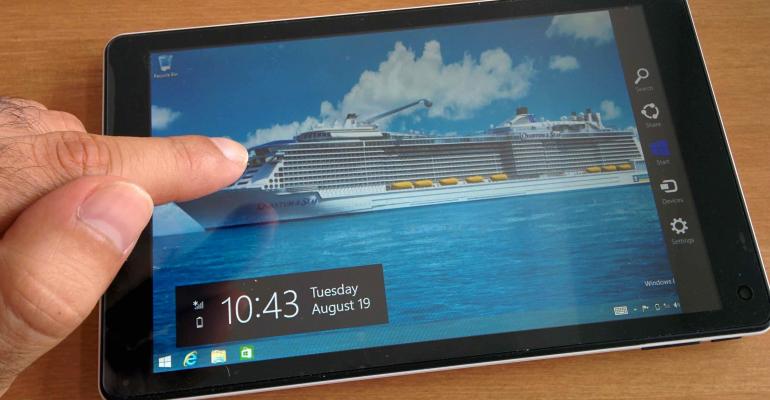He quoted a recent Cruise Critic survey that confirmed the industry is not yet meeting passenger expectations on connectivity and session moderator CSC Management and Digital Video Systems ceo Chuck Sackermann said that 'while cruise lines have done quite well along with service providers in trying to meet those expectations, it really is a monumental mountain to climb.'
But there was good news from ITC Global ceo Joe Spytek who promised: 'Our goals in the cruise sector are nothing short of transformational.
'By leveraging the newest technology, we believe that we will reach price levels that create a tipping point in the industry in 2019/2020 when we will be delivering a gigabit per ship (a billion bits per second transmitted).
'We are on the verge of a step change, a step up in functionality. This is the first time that we have seen what is in orbit being improved and expanded in advance of what is on the ground being improved.
'We are getting close to the point when cost will no longer be an impediment to delivering these services.
'This expansion will eventually level out but we now have to work closely with the cruise lines as the investments involved are often of millions of dollars and, as the lifecycles of each new development have shortened dramatically, so contract lengths are getting shorter.
Redcell Technologies ceo Tennyson La Jeunesse observed it was surprising that cruise lines had not yet integrated IT infrastructure into their monitoring of the passenger experience package when 'for most passengers, posting their experiences as they happen on Instagram is a such key part of their enjoyment of the cruise.'
Carnival vp global connectivity Reza Rasoulian said that, as far as the 10 Carnival brands are concerned, they see connectivity as key for their passengers. 'It was feedback from them that drove the development of our Wi-Fi programs and we are still using it to help evolve the infrastructure and pricing.'
Passenger calls for free Internet across the board, though, are unlikely to be answered. He said that, while free Internet is used as an incentive or as a reward within the brand loyalty clubs, 'we have to balance our shareholder commitment with those passenger expectations. It needs to make economic sense.'
Sackermann pointed out the cost of providing free Wi-Fi in a land-based hotel or resort is on a much lower scale than that involved for a cruise line and Martin added that 'everywhere it is free, the service is usually bad.'
Rasoulian said: 'We also have to consider the impact on the user experience if we did offer it for free to everyone.'
This concern was echoed by La Jeunesse: 'Once we uncork the top of the ship, we have to ensure that the infrastructure inside is capable of handling the extra capacity. There has to be a strategy where we bring some of the content local to the ship, otherwise the sheer number of devices is going to saturate the space.'
'The buyer persona is changing,' according to O3b's Martin. 'Over the past 10 years, cruise passengers have been about laptops or tablets but, over the next 10, they will not limit themselves to just one device. I carry three—phone, tablet and laptop—and it would be foolish not to think that passengers will be doing the same.
'We need to focus on enabling them to connect all those devices. Pervasive wireless is an absolute must as 29% of US viewers do not subscribe to cable TV and use streaming devices instead.'
La Jeunesse said: 'Increasingly the user will want to bring what they do at home with them, meaning that their own devices will be the key and we are already seeing more and more places where these devices can interact with ship infrastructure.
'There has always been a hard line between passenger devices and ship-owned infrastructure as far as content is concerned but there will now have to be a compromise with fewer locked doors.'
Martin said: 'Computers are becoming less and less like computers with that aspect being moved onto the Cloud. People are becoming smarter about which devices are best for what purpose.'
Rasoulian said: 'We were one of the first cruise companies to move to unrestricted, social media plans. That was good but only for a period and now we are working on the next generation of systems. That is the only way to keep on top of it.
'Five years ago, you couldn’t stream from your Facebook account at sea; today you can actually broadcast yourself.
'It is not just about bandwidth. With our partners and suppliers, we need to push the limits of everything to deliver a home-like experience. For those passengers who would prefer to be disconnected, that is fine as our ships are designed to offer choice. But a large and increasing number of the population across all demographics demand that fully-connected experience.
'As an industry, we have been working towards better, faster connectivity. At first, the technology just wasn’t available at the right price-point or from an infrastructure perspective.'
But that has changed. 'The cruise industry is big enough to move the needle where some other industries are not,' Spytek said.
But size brings its own problems, too. Rasoulian said: 'We like to provide the whole range of experiences across the fleet but we have to be pragmatic as we can’t just upgrade all 102 ships at same time.
'We work with finance, business and technology partners and, if we feel that there is one that has not provided the level of service we need, we have no problem in-housing. But we prefer not to.
'Also, although we can’t bet our business on theory, we did hire a few dreamers from the technology industry and they’re doing a great job for us.'
Copyright © 2024. All rights reserved. Seatrade, a trading name of Informa Markets (UK) Limited. Add Seatrade Cruise News to your Google News feed.


